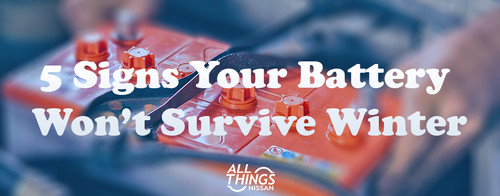5 Signs Your Battery Won’t Survive Winter
Posted by Sydney Selleck on Jan 30th 2025
Cold winter weather can be tough on your vehicle, more specifically on your vehicles battery. When temperatures plummet, the strain on your battery increases significantly, making it harder for your car to start. A failing battery can leave you stranded on a cold day—a situation no one wants to face. Knowing the warning signs of a failing battery can save you time, money, and hassle.
Here are five key indicators that your car battery might not make it through the winter.
Slow Engine Crank
Have you noticed your engine struggling to start, especially on chilly mornings? A slow or labored cranking sound when you turn the key is often the first sign of a weakening battery. The cold weather requires your battery to work harder, so if it’s already on its last legs, it’ll struggle to power your vehicle.
Dim Lights & Electrical Issues
If your headlights, interior lights, or dashboard displays seem dimmer than usual, it’s a clear sign your battery might be losing its charge. Additionally, issues with power windows, heated seats, or other electrical components could indicate a failing battery.
Corrosion on Battery Terminals
When was the last time you checked under the hood? If you see a white, ashy powder around the terminals, it’s a sign of corrosion. Corrosion can interfere with the battery’s ability to charge and supply power to your vehicle. Cleaning the terminals might help temporarily, but significant buildup often signals a more serious problem.
Battery Age
Even the best car batteries don’t last forever. In general, a car battery will last anywhere between three to five years, but that lifespan can be shortened by extreme weather conditions—both hot summers and cold winters. If your battery is approaching that three-year mark, it’s a good idea to start keeping an eye on its performance, especially as winter approaches. Check your battery’s manufacture date, typically stamped on the casing, to determine its age.
Frequent Jump Starts
If you find yourself constantly needing to jump-start your car, there’s a good chance your battery is on its last leg. While an occasional jump-start may be normal, especially if you’ve left your lights on overnight, needing to jump-start your vehicle frequently is a big red flag. Frequent jump-starts are a sign that the battery is unable to hold a charge.
If your car battery is showing any of these signs, it’s a good idea to have it tested by a professional. Many auto parts stores and service centers offer free battery testing and can recommend a replacement if needed. Consider investing in a quality battery with a high cold cranking amp (CCA) rating to handle winter’s demands.
Additionally, keep jumper cables or a portable jump starter in your vehicle for emergencies. Regular maintenance, like checking your battery connections and ensuring they’re clean and tight, can also prolong its life.



